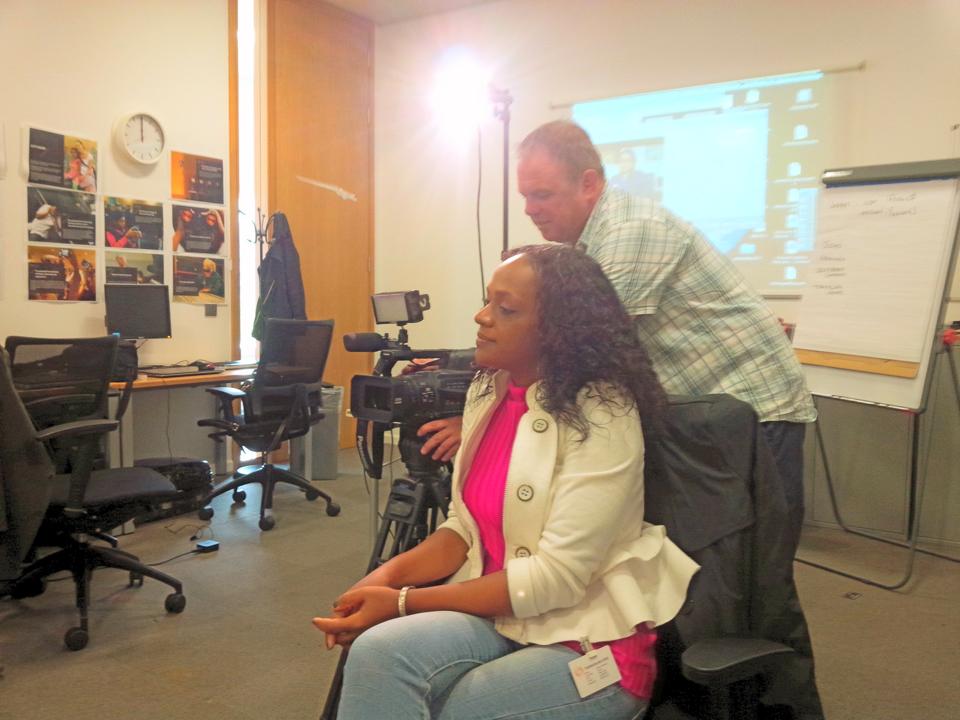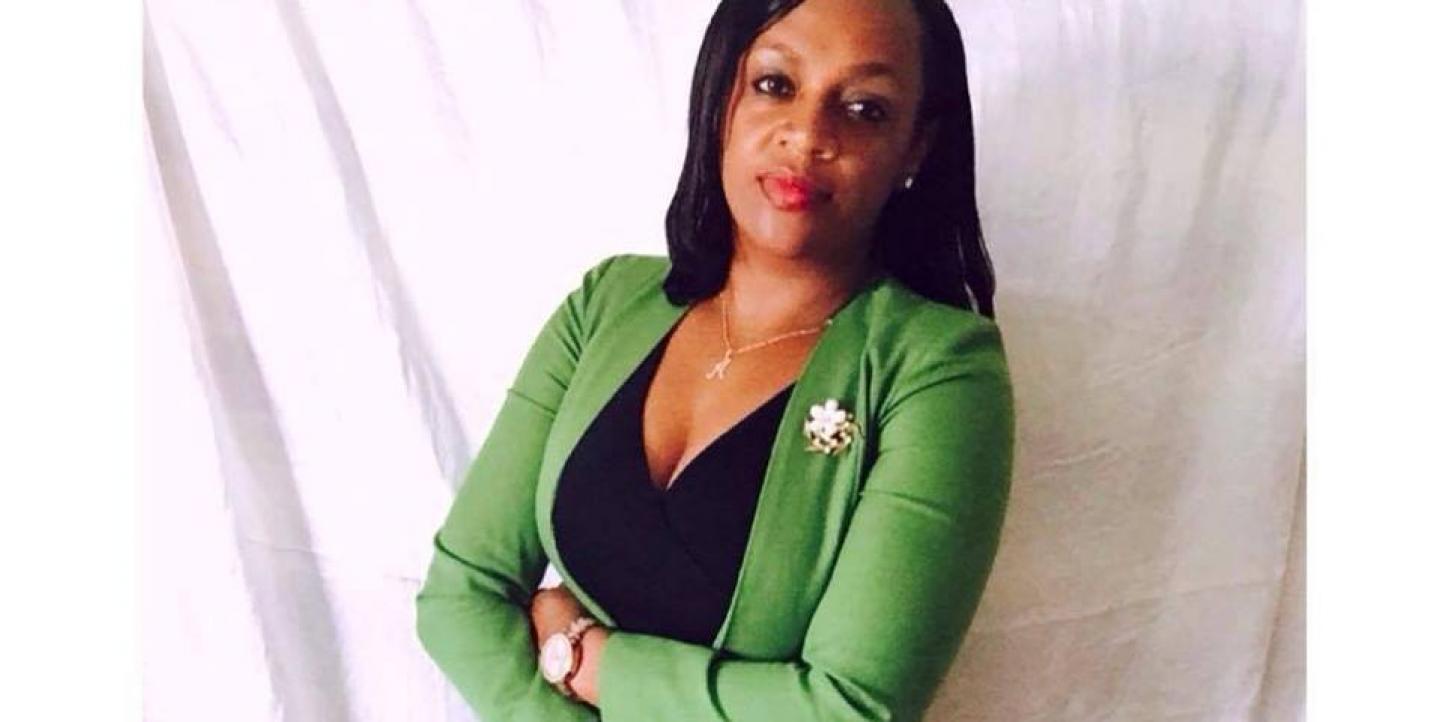Each month, IJNet features an international journalist who exemplifies the profession and has used the site to further his or her career. If you would like to be featured, click here.
Alison Kentish, a journalist in St. Lucia, spent last weekend covering the funeral service for Botham Jean, a St. Lucian man who was killed in his home in Dallas, Texas by a police officer.
“That put St. Lucia on the international map, but not for the best reasons,” said Kentish. “You're human before you're a journalist, and sometimes the story crushes you.”
Born and raised in Dominica, Kentish moved to St. Lucia for college, where she studied criminal justice as an undergraduate. However, her true interest was in storytelling. When she was younger, she would sit in front of the television after school to watch CNN news anchor Bobbie Battista, relishing the way Battista made her viewers feel like she was speaking directly to them.
She is pursuing an MA in international journalism, and has also taken advantage of training opportunities, some of which she found through IJNet, to advance her career and reporting abilities. Eventually, she had the opportunity to work with Helen Television Systems (HTS), where she now works as the senior news producer and anchor of the nightly newscast.
Kentish has also carved out a niche in climate reporting, something that has progressively grown in popularity since she first started covering it eight years ago. Since then, she has traveled to Paris to cover the Conference of Parties (COP) 21 and started her own media organization, Kentish Media, dedicated to increasing the popularity and prestige of climate reporting.
“We've had to fight for a long long time to get climate issues on the front page at the top of the newscast,” she said. “But I think we've come a long way, especially living in the Caribbean [because of] what we've been through with hurricanes. People are starting to realize that this is serious business, and that climate change is also a human story because it impacts our lives.”
IJNet spoke to Kentish about her work, the Caribbean media environment and the ways that IJNet has impacted her career.
IJNet: How did you become interested in reporting on climate change and the environment?
Kentish: Firstly, it came from just being Dominican. Dominica's known as the nature island of the Caribbean. There's this saying that if Christopher Columbus came back, Dominica is one of the countries he would still recognize. That's good and bad. It also means in terms of development we haven’t moved that far, but I always tell people that if you're looking for somewhere green and clean that you can just go and relax and unplug, Dominica is the place to go. We take the environment seriously.
Moving I realized that littering and human-induced climate change wasn't affecting many countries. So I think I started on the environment beat just trying to get people to realize the importance of not throwing your garbage out the window of a moving vehicle and it led me into doing more about climate change
I'm very passionate about climate issues and the environment and explaining them people because for a long time people just didn't get it. The language behind it was often confusing and a bit difficult for people to understand, so I’ve tried to tell it from a human angle.
Tell me about your media organization.
It's called Kentish media. I wanted to use my surname in memory of my brother who was killed a few years ago, and I thought it would just be a good way to just honor him. We focus on nonprofit organizations and trying to get the climate beat going.
[Last year] when Dominica was still rebuilding from tropical storm Erika, then came Hurricane Maria — a Category 5 storm — just about this time last year. It was the most devastating storm we've ever had. Again it was a truly, truly heart-wrenching experience to visit Dominica after that storm. From interviewing people that time I realized that people are getting it, they know that the climate is changing and they want to know more.
 What challenges have you encountered working in St. Lucia and other islands in the Caribbean?
What challenges have you encountered working in St. Lucia and other islands in the Caribbean?
In our region, the challenges are always small islands, small newsrooms and few resources for training. I think that's what led me to finding IJNet, and I share IJNet with anyone who is new and comes into the newsroom because I know what it's like to have a budget of zero dollars for training.
I think that's one of the biggest problems, that you don't have the money to be able to put into training young reporters coming in. I'm grateful that the people that started with us took our enthusiasm and we channeled it into looking for training for ourselves because not everyone can get up and go to journalism school, not everyone can afford it.
In terms of the tools and resources available in our newsrooms, sometimes that's a challenge also. It means that as you grow, you also have to invest in some of your own.
How has IJNet impacted your career?
The very first opportunity I saw on IJNet was with Reuters AlertNet. They were putting on a course in financial journalism, which is my weakest area. I just avoid it. And I said, "Let me try. I’m going to embrace this." It was really an eye-opener because of the type of course. It was five days, but it was really intense. I left that course feeling much more capable. When my editor called on me to do [a story on the] prime minister presenting a budget and addressing parliament, I didn't complain. [I thought], “I'm going to try to put some of what I learned into practice,” and I did. I haven't been avoiding those stories since.
Then I found a backpack journalism course [from the Thomson Reuters Foundation], and this one has truly helped my career. It was centered on producing a story using just what you have in your backpack. You pack your bag and go out there and you do your shooting, your writing, your editing, your filing from the field. This came in handy when I had to hop on a boat and head to Dominica after a storm. [It was] truly practical and I think it was one of the best courses I've ever done in my life.
What advice do you have for young journalists?
I would tell them that the challenges will be many. Let's not even kid ourselves here. You're going to meet many stumbling blocks. We mentioned some of them, like maybe you'll want to get a lot of training and your department doesn't have a budget for [it]. That's where you have to be very resourceful and use the technology [and platforms] available to you for self-development. Many of the international news media houses have their own.
I'd say read, educate yourself, watch the international networks [and] try to find opportunities for training, because they are out there.
Our field is dynamic and it's constantly evolving. You have to stay on top of your game and just be the best journalist that you can be. Always adhere to the basic tenants of our profession: Try to be fair at all times, try to give each side a listening ear and remember that there's more than one side to a story.
This post was updated on October 14, 2018.
This interview was edited for length. Images courtesy of Alison Kentish.


